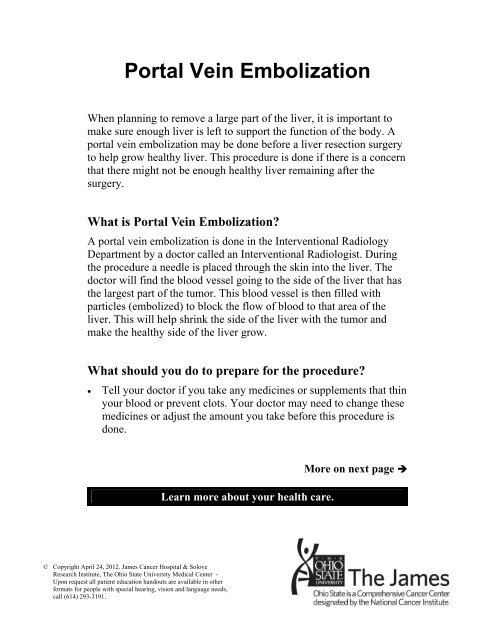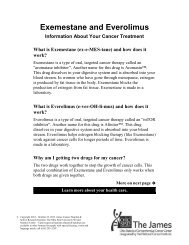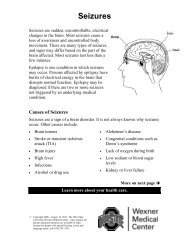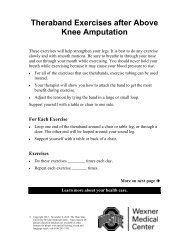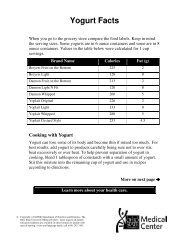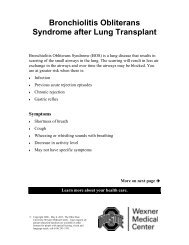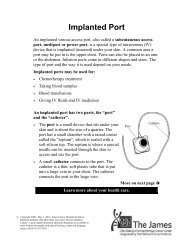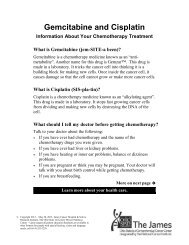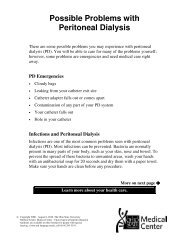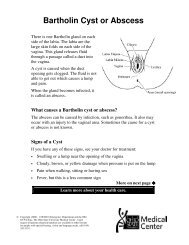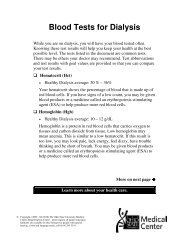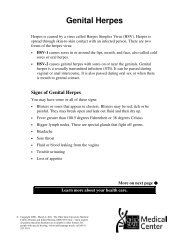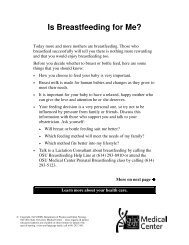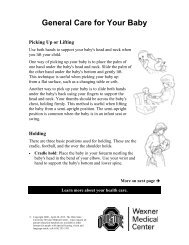Portal Vein Embolization - Patient Education Home
Portal Vein Embolization - Patient Education Home
Portal Vein Embolization - Patient Education Home
Create successful ePaper yourself
Turn your PDF publications into a flip-book with our unique Google optimized e-Paper software.
<strong>Portal</strong> <strong>Vein</strong> <strong>Embolization</strong><br />
When planning to remove a large part of the liver, it is important to<br />
make sure enough liver is left to support the function of the body. A<br />
portal vein embolization may be done before a liver resection surgery<br />
to help grow healthy liver. This procedure is done if there is a concern<br />
that there might not be enough healthy liver remaining after the<br />
surgery.<br />
What is <strong>Portal</strong> <strong>Vein</strong> <strong>Embolization</strong>?<br />
A portal vein embolization is done in the Interventional Radiology<br />
Department by a doctor called an Interventional Radiologist. During<br />
the procedure a needle is placed through the skin into the liver. The<br />
doctor will find the blood vessel going to the side of the liver that has<br />
the largest part of the tumor. This blood vessel is then filled with<br />
particles (embolized) to block the flow of blood to that area of the<br />
liver. This will help shrink the side of the liver with the tumor and<br />
make the healthy side of the liver grow.<br />
What should you do to prepare for the procedure?<br />
Tell your doctor if you take any medicines or supplements that thin<br />
your blood or prevent clots. Your doctor may need to change these<br />
medicines or adjust the amount you take before this procedure is<br />
done.<br />
© Copyright April 24, 2012. James Cancer Hospital & Solove<br />
Research Institute, The Ohio State University Medical Center -<br />
Upon request all patient education handouts are available in other<br />
formats for people with special hearing, vision and language needs,<br />
call (614) 293-3191.<br />
Learn more about your health care.<br />
More on next page
Page 2<br />
If your surgery or procedure is cancelled for any reason, call<br />
your doctor because you may need to restart the medicines you<br />
take to thin your blood or prevent clots.<br />
The night before the procedure, do not eat anything after midnight.<br />
You may have sips of clear liquids (water, apple juice, coffee or<br />
tea without milk) until 6 am, unless you have been told by your<br />
doctor to limit fluids.<br />
What should you expect on the day of your procedure?<br />
When you arrive at the hospital, you should go to the Admitting<br />
Office located in Room 105 in Rhodes Hall. After you check in,<br />
you will be taken to a room in The James Cancer Hospital where<br />
you will be prepared for the procedure. A nurse will check your<br />
blood work and start an IV.<br />
When everything is ready, you will be taken to the procedure area.<br />
The procedure will be explained to you and you will be given a<br />
chance to ask questions. You will then be asked to sign a consent<br />
form.<br />
You will need to lie still for a long time, so make sure you go to<br />
the bathroom before you are taken to the procedure room.<br />
When it is time, you will be taken to a procedure room. You will<br />
be placed on a table for the procedure. If you are cold, have pain,<br />
or any other discomforts, please tell the nurse.<br />
When the procedure is done, you will be taken to the recovery area<br />
and watched for a short time to make sure your pulse, blood<br />
pressure, and oxygen levels are stable and that you have no<br />
bleeding from the needle site. You will then be taken to your room<br />
at The James.<br />
What should you expect after your procedure?<br />
When you return to your room the nurse will help you get<br />
comfortable in your bed. Tell your nurse if you are in pain or need<br />
any medicine.
Page 3<br />
Use your call button to ask for help before you try to get out of<br />
bed or out of a chair. You will be given medicine that could make<br />
you dizzy or less coordinated, so it is important to have someone<br />
help you when you first begin to move around.<br />
You will be able to eat and drink, but do so slowly. Some of the<br />
medicines you will be given could make your stomach feel sick.<br />
Do not take pills on an empty stomach. The nurse can get you<br />
crackers or something to eat before you take your pills.<br />
You will stay in the hospital overnight to make sure you are able to<br />
drink plenty of fluids and take your medicine. Your blood work<br />
will be checked in the morning. If it is okay, you will be allowed<br />
to leave the hospital.<br />
You may have pain in your right side, your abdomen, your back, or<br />
in your right shoulder. You will be given a prescription for pain<br />
medicine. Take the pain medicine if you need it. The first 3 to 5<br />
days are usually the most uncomfortable after the procedure.<br />
You may also have a fever during this time. You may take up to<br />
2000 mg per day of acetaminophen (Tylenol) or ibuprofen (Advil,<br />
Motrin) if needed for a fever.<br />
After several weeks, the healthy liver should have grown to the<br />
point where there is now enough liver to do a liver resection<br />
surgery.<br />
Four to six weeks after your embolization, your doctor will do a<br />
CT scan or MRI to determine when it is safe to do surgery.<br />
When should I call the doctor?<br />
If you have any questions or concerns, please call your doctor’s<br />
office. The phones are answered 24 hours per day. If you reach the<br />
answering service at night or on the weekend, they will contact your<br />
doctor or the doctor who is on call and have them call you back.


